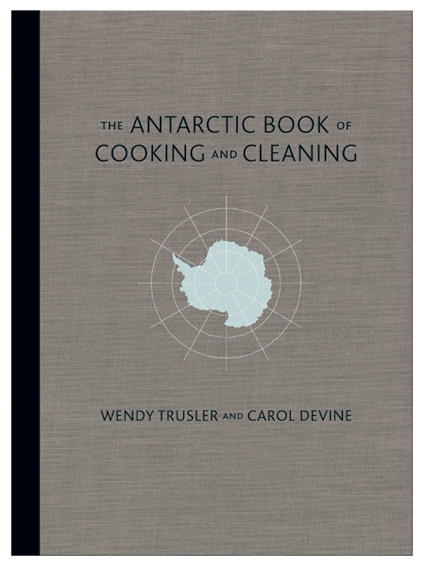When you think of the earth’s frigid southernmost continent, probably not too many super fun images come to mind. (Parkas, perpetual darkness, few living organisms aside from penguins and algae…)
Wendy Trusler and Carol Devine, two females who led a volunteer clean-up crew in Antarctica in 1996, inadvertently proved that the south pole can be a party. Their in-the-works book showcases the summer they spent clearing accumulated debris off the coast, making new friends, and of course, cooking. It also pays homage to the early explorers of the ice continent, incorporating vintage photos and historical facts with Trusler and Devine’s own journal excerpts, recipes, and menu plans.
Reminiscent of a vintage home-ec textbook, the book shows how cooking was an indispensable tool in their expedition. “The real substance of the expedition and of the book is that we care about the Antarctic and poles and the environment … but it was undeniable that the reason the expedition went so well and was so memorable and a big part of it was through the lens of food,” says Devine.
Stationed among camps of Chileans, Uruguayans, Russians and Chinese, Trusler and Devine found their dinner table peppered with representatives from several different countries. “We’d have these really international meals,” says Trusler. “We didn’t share a language but we’d end up talking about food – that was the common thing. I’d gather recipes from the surrounding bases and I liked to try them out on the people where the food came from.” She made dishes from cazuela to chocolate chip cookies full time in a makeshift kitchen she installed herself in a small empty building.
Setting up her kitchen wasn’t even the most challenging part. Trusler’s freezer was kept in their Chilean neighbours base camp, so every time she wanted to make a meat dish, she had to essentially trek to another country. But when she didn’t want to do that, she could hitch a ride on a helicopter (which she sometimes did, in exchange for chocolate cake.)
Keeping a hungry crew of 9 – 15 volunteers satisfied from the improvised digs required resourcefulness and a bit of domestic magic. “There was this shelf on one wall which had a whole bunch of empty vodka bottles on it and it moved. Behind it was a room filled with old radio equipment from the Cold War era – it was a secret communications room. I cleared all the wires out and made it my pantry, then filled the vodka bottles up with spices,” says Trusler.
Clearly, domesticity meets badassery in The Antarctic Book of Cooking and Cleaning, where the antarctic as a place where household chores gain political meaning and pleasure definitely exists. Help these rad ladies publish their book by pre ordering yours now!
~ Kait Fowlie



 Follow Us On Instagram
Follow Us On Instagram
